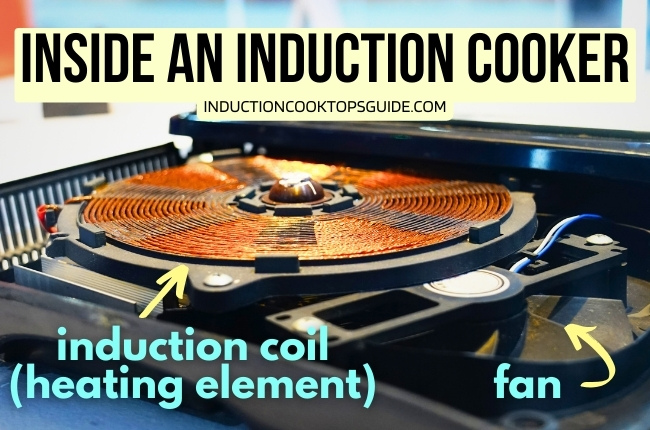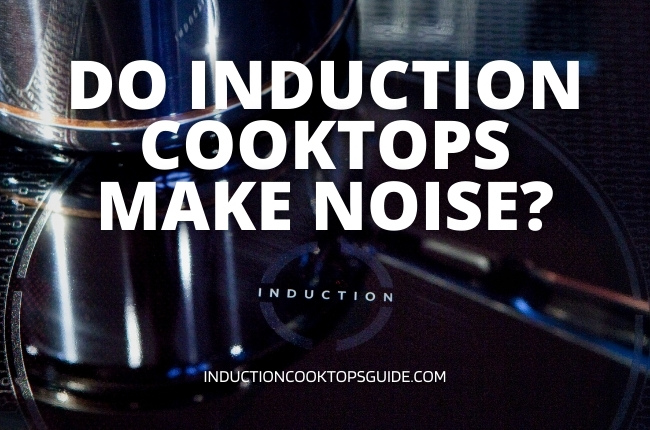Induction cooktops are the new kids on the block when it comes to efficient home cooking. Gas and electric stoves are growing less popular in the modern kitchen.
But really, who’s surprised?
Induction stoves are taking over because of their convenient and energy-efficient heating.
It’s a popular choice for people going for a cleaner look in the kitchen as well — usually featuring a sleek stove top that’s aesthetically pleasing and easy to clean.
It’s also a safer option too because, without a compatible pan, the heat doesn’t transfer, keeping you and your family safe from accidents like burns.
However, with all of its bells and whistles, the induction cooker isn’t perfect just yet.
And there is one common problem among its users that can drive one crazy. Is it normal for an induction cooktop to make noise?
Yes, if you haven’t heard it yourself before, count yourself lucky, though you might start taking notice now. But there have been some instances where induction cookers can make noise.
So, why do induction cooktops make noise? Are all induction cooktops noisy? Let’s get to the bottom of these sounds and see how you can stop or prevent them.
Should an induction cooktop make noise?
Do all induction cooktops make noise? To some degree, you should expect a little bit of noise from just about any induction cooktop.
Usually, it’s a tolerable one. Something you might be able to drown out pretty quickly.
An induction cooker’s most typical normal sound can be described as a soft, consistent hum.
More often than not, this sound is simply caused by the type of cookware you use on the induction burner.
More lightweight cookware, such as those made of stainless steel, can jostle around a little more than heavier pots and pans, such as those made of cast iron.
You might not be able to see it, but the tiny, unnoticeable movement of the cookware on the stove causes a slight hum to happen.
How loud is an induction range?
At its baseline, when your stove is working correctly, the sounds of an induction range should be silent to negligible.
Often, it’s just a humming sound that would usually be heard when using the stove on its highest or most powerful setting.
However, in other instances, often due to the cookware, your induction stove can produce various possible sounds.
What does an induction range sound like?
As mentioned, induction ranges can make all kinds of sounds, depending on your stove and cookware.
The low, steady hum is most common, but it can clang, hiss, woosh, bang, or buzz!
A lot of the time, this usually is still within the normal range of sounds your cooktop can produce.
But knowing what to look out for when it comes to the sounds your kitchen appliances make would be best to prevent damage or other untoward accidents.
Why does my induction cooktop make a noise?
So, you can breathe a sigh of relief, knowing that the sounds you’re hearing from your induction stove are pretty normal to similar appliances.
Before we figure out what sound means what, let’s cover the basics of why induction cooktops make sounds.
The sound has everything to do with how induction cookers work.
Induction stove tops are so different from gas and electric because they don’t just heat pots and pans directly upon contact.
What happens instead is that when an induction stove is plugged in and turned on, the metal coils start a magnetic current which guides the heat through the cookware that you’re using.
So instead of just heating up directly and warming up whichever surface the coils are in contact with, the heat travels through the magnetic currents to evenly heat up your cookware.
But with this current comes some of the noise you might be hearing. The currents are so strong they can start causing the particles of your cookware to vibrate.
And what is sound, really, if not just a bunch of vibrations?
And that’s the science behind it! Your pots and pans are just moving on the tiniest level, unseen to the naked eye.
Well, at least that explains the induction stove buzzing sound. But what about the other sounds it can make, like hissing or buzzing or clicking?
Do induction cooktops make fan noise?

Yes, possibly! Besides the ferromagnetic coil, a fan is another important part of an induction stove.
This fan is found on every stove hob and is crucial for keeping your stove working well.
How? With so much heat being generated, there needs to be a foil to it–one that can cool down the hob when required.
See, the technology that makes induction work so well only functions at a certain temperature. So, the fan is there to maintain that working level.
The fan can sound softer or louder, depending on how much cooling down is needed.
That’s why sometimes you might notice the whir of a fan even after you’re done with cooking, while other times it’s as if the fan is not there at all.
Why is my induction cooktop buzzing?
What does it mean when your induction cooktop is buzzing? Don’t worry; it’s not some kind of electrical problem or an issue with your stove.
It actually has a very similar culprit to the humming sound you might hear!
All it is is the magnetic field working on your cookware and causing it to shimmy and shake a little, making that buzzing sound.
Why is my induction stove making a high-pitched noise?
This might be the most annoying noise of them all. Some people report hearing a loud, shrill (sometimes ear-splitting) noise coming from their stoves. Yikes!
Well, it definitely is a nuisance, and there are ways to stop it.
But if all you’re concerned about is whether or not this is a cause to worry, it’s not. It all comes with the territory of using an induction cooker.
Why does my induction cooktop keep clicking?
Clicking sounds are some of the more subtle noises that an induction stove can make. But it can still be a little annoying if it happens too often.
These sounds are emitted by the parts that control whether the stove is on or off. In other words, it’s usually just a feature that regulates the power inside of the stove that causes the clicking.
If you notice the clicking or clanging while you’re cooking, it can also be due to a misshapen, warped pot or pan.
Try checking your cookware first to see if the clicking noise is associated with a specific piece of kitchenware.
How do I stop my induction cooktop from making noise?
There are many ways to try and stop the noises that your induction cooker makes.
But for the most part, 2 options can easily fix the problem: adjusting the heat level or switching up your cookware.
1. Adjusting the heat level
Using high heat requires more power. In turn, it also generates more of the magnetic charge to get it going.
Now that you know how the magnetism actually causes some of the sounds that induction stoves can make, it’s easy to understand how lowering the heat level could lessen the noise.
It could also mean you’d hear less of the fan if you bring the hob up to a more moderate temperature.
This would then minimize the humming sound from the magnetic currents as well as the whirring sound of the fan.
2. Changing cookware
Did you know that the size of your cookware can play a part in lessening the noise of your induction stove top?
Yes! Whistling and humming sounds may be caused by using cookware that is either too small or too big for your burner.
The thickness of your kitchenware can matter too. Heavier pots and pans are less likely to be moved by the vibrations, making less sound.
Conclusion
So, save for a few hums and clicks and buzzes, you can cook in peace, knowing that most of the sounds your induction burner makes are all part of the process to be expected.
But you don’t have to suffer silently while your stove whistles and clatters away.
Experimenting with your cookware type and size is a massive help to finding the right kind for a more quiet and relaxed cooking time.
And while all these sounds are typical with induction burners, when in doubt, it’ll still be best to consult a professional to get to the bottom of your mystery sound.

Leave a Reply